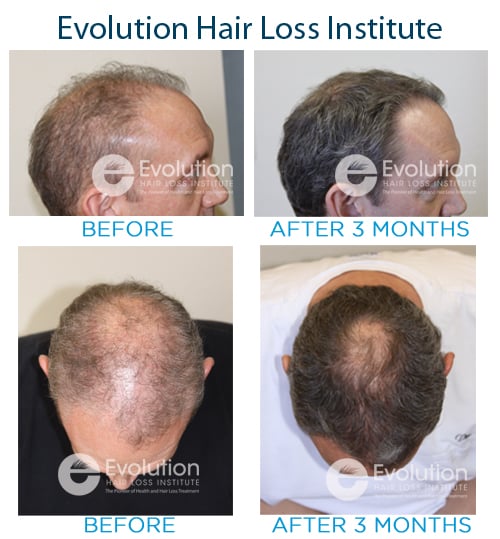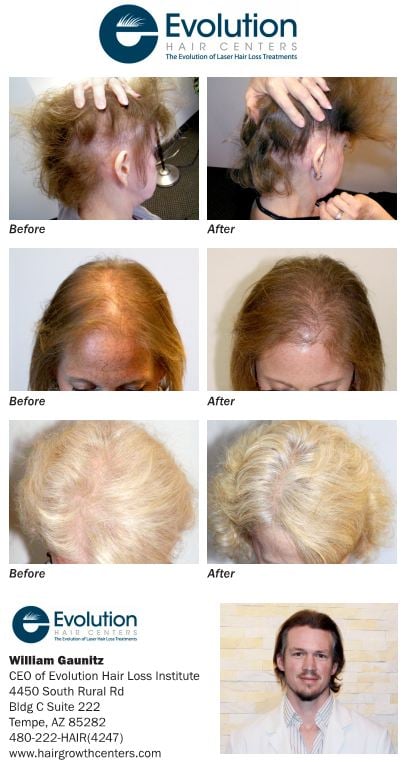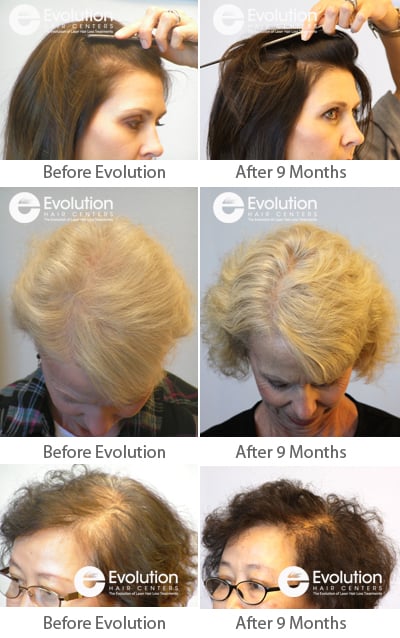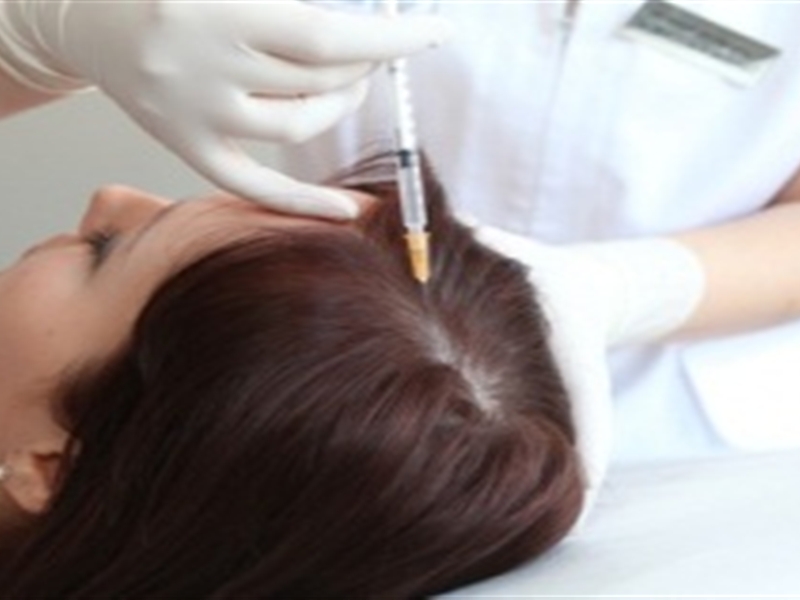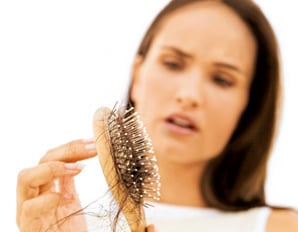William Gaunitz and Evolution Hair Centers of Tempe was recently been featured in the article below. Evolution Hair Centers has consistently been getting new attention for the effectiveness of the Evolution Hair Centers hair loss treatment for women.
A Silent Issue: Women and Hair Loss
By Katie Snyder
Fact: Hair loss is no longer just a men’s issue, it affects women too.
And if you’ve ever glanced down at your hairbrush and found a sizable clump of freshly-pulled hair, or looked at your hair and realized it appeared way thinner than it used to be, you know how frightening it can be.
“Today, more than 21 million women suffer from hair loss across the United States,” said William Gaunitz WTS, founder of Evolution Hair Centers. “While most common in older women, it can affect even women who are in their 20’s and 30’s.”
Every year, the taboo topic leaves women of all ages suffering in silence as they search for reasons why and solutions to fix their often embarrassing condition.
The good news? There are answers.
Is my hair loss normal?
Not all hair loss is bad hair loss. As women age, their hair will naturally fall out and replace itself with a fresh hair in the follicle. But there are other factors that may determine if the hair loss is more permanent—like genetics.
“If you have hair loss and the androgenetic alopecia gene, which is the hereditary female pattern hair loss gene, and it runs in either side of the family tree, you are more likely to have female pattern thinning and hair loss,” said Gaunitz.
This isn’t always the case. There may also be other factors including health conditions, family history and lifestyle factors that lead to the two other most common hair loss conditions among women: telogen effluvium, the shedding of hair brought on by stressful events or illness, and alopecia areata, a recurrent disease that results in a typical pattern of diffuse hair thinning over the middle scalp.
According to William Gaunitz, other factors might include:
Hormonal Imbalance
This can be caused by unbalanced levels of androgens, namely dihydrotestosterone(DHT) and estrogen. Other hormonal imbalances such as thyroid problems and genetic hormonal responses to autoimmune conditions can also cause thinning of the hair.
Stress
Remember that saying “you’re going to make my hair fall out?” Well it’s true. When women experience stress, the adrenal glands become overworked it increases the levels of cortisol in the body. In return, a woman can produce an excess of hormones that can sometimes cause the hair to fall out.
Pregnancy
After a pregnancy a woman’s hormones can be in disarray. It is perfectly common for post-partum mothers to experience thinning of the hair and even bald patches. In most cases, once the hormone levels have balanced back out, the hair should grow back.
Birth Control
Perhaps the most common is birth control. When women start and stop birth control it changes the levels or hormones in their body which can temporarily cause hair loss.
Prevention and Treatment Options
“While you cannot fight your genes, you can fight the effects of aging and hormonal imbalance,” said Gaunitz. “While losing hair can be embarrassing, chances are it’s something that’s easily treatable.”
Being able to analyze full medical history, as well as details relating to lifestyle, family, diet and any medication you may be taking is essential to getting the right diagnosis and treatment.
Other helpful hair loss prevention tips:
• Use organic and anti-inflammatory shampoos and other products that are cleansing to the scalp to help flush out hormonal build up inside the hair follicles.
• Maintain a healthy diet full of fiber and vitamin rich foods.
• Try out over the counter products such as Minoxidil (Rogaine).
• Make sure to use the right nutritional supplements.
“Hormones can be easily manipulated in women with nutritional supplements,” said Gaunitz. “The combination of the right nutritional supplements, healthy diet and organic shampoo and conditioner will usually stop a female’s hair loss.”
For more extreme cases, low level laser therapy is also available for women who want to increase the quantity and quality of hair in the hair shaft that is already being produced.
For more information, visit Evolution Hair Centers or go to Angry Hair Guy.
A Silent Issue: Women and Hair Loss
By Katie Snyder
Fact: Hair loss is no longer just a men’s issue, it affects women too.
And if you’ve ever glanced down at your hairbrush and found a sizable clump of freshly-pulled hair, or looked at your hair and realized it appeared way thinner than it used to be, you know how frightening it can be.
“Today, more than 21 million women suffer from hair loss across the United States,” said William Gaunitz WTS, founder of Evolution Hair Centers. “While most common in older women, it can affect even women who are in their 20’s and 30’s.”
Every year, the taboo topic leaves women of all ages suffering in silence as they search for reasons why and solutions to fix their often embarrassing condition.
The good news? There are answers.
Is my hair loss normal?
Not all hair loss is bad hair loss. As women age, their hair will naturally fall out and replace itself with a fresh hair in the follicle. But there are other factors that may determine if the hair loss is more permanent—like genetics.
“If you have hair loss and the androgenetic alopecia gene, which is the hereditary female pattern hair loss gene, and it runs in either side of the family tree, you are more likely to have female pattern thinning and hair loss,” said Gaunitz.
This isn’t always the case. There may also be other factors including health conditions, family history and lifestyle factors that lead to the two other most common hair loss conditions among women: telogen effluvium, the shedding of hair brought on by stressful events or illness, and alopecia areata, a recurrent disease that results in a typical pattern of diffuse hair thinning over the middle scalp.
According to Gaunitz, other factors might include:
Hormonal Imbalance
This can be caused by unbalanced levels of androgens, namely dihydrotestosterone(DHT) and estrogen. Other hormonal imbalances such as thyroid problems and genetic hormonal responses to autoimmune conditions can also cause thinning of the hair.
Stress
Remember that saying “you’re going to make my hair fall out?” Well it’s true. When women experience stress, the adrenal glands become overworked it increases the levels of cortisol in the body. In return, a woman can produce an excess of hormones that can sometimes cause the hair to fall out.
Pregnancy
After a pregnancy a woman’s hormones can be in disarray. It is perfectly common for post-partum mothers to experience thinning of the hair and even bald patches. In most cases, once the hormone levels have balanced back out, the hair should grow back.
Birth Control
Perhaps the most common is birth control. When women start and stop birth control it changes the levels or hormones in their body which can temporarily cause hair loss.
Prevention and Treatment Options
“While you cannot fight your genes, you can fight the effects of aging and hormonal imbalance,” said Gaunitz. “While losing hair can be embarrassing, chances are it’s something that’s easily treatable.”
Being able to analyze full medical history, as well as details relating to lifestyle, family, diet and any medication you may be taking is essential to getting the right diagnosis and treatment.
Other helpful hair loss prevention tips:
- Use organic and anti-inflammatory shampoos and other products that are cleansing to the scalp to help flush out hormonal build up inside the hair follicles.
- Maintain a healthy diet full of fiber and vitamin rich foods.
- Try out over the counter products such as Monoxidil (Rogaine).
- Make sure to use the right nutritional supplements.
“Hormones can be easily manipulated in women with nutritional supplements,” said Gaunitz. “The combination of the right nutritional supplements, healthy diet and organic shampoo and conditioner will usually stop a female’s hair loss.”
For more extreme cases, low level laser therapy is also available for women who want to increase the quantity and quality of hair in the hair shaft that is already being produced.
For more information, visit www.hairgrowthcenters.com.
